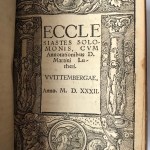LUTHER, Martin. In Esaiam prophetam scholia ex Doctori Martini Lutheri praelectionibus collecta [with] Id., Ecclesiastes Solomonis, cum annotationibus Doctori Martini Lutheri.
Wittenberg, Iohannes Lufft, 1532.
£ 4,500
“If I had known that the world was so puzzlingly evil, I would never have begun the task of preaching and writing.”
(Chapter 42)
FIRST EDITIONS. 8vo, two works in one volume: 1) ff. (viii) 264, Aa8 a-z8 A-K8; ff. 2) ff. (iv) 126, (4). A-Q8. Italic and Roman letter. Title page of first commentary within elaborate border; at foot page, coat of arms of the house of Frederick III the Wise, Elector of Saxony and protector of Luther. Early autograph on t-p (‘Christoph. Dimberg’ from Wiehe in Thuringia); ms. ex libris on front pastedown, unclear, with shelfmark and other notes. Second title within a classical border decorated with head profiles, a laureate imperial portrait to the top and figures in armour to the foot of the page; verso with full-page annotation in German. Handwritten chapter reference number on top outer corner of pages. Marginal browning and damp staining, occasional thumb marks and ink spots, and marginalia throughout. Final leaf with outer corners torn, no text loss. In contemporary German blind-stamped and tooled pigskin over boards with figures and floral motives, catches and remains of clasps.
Two rare first editions of Luther in a contemporary anthology. Concerning Isaiah’s message he says, “These are words of consolation. Just hold tight, even if you are oppressed and persecuted and your thoughts and conscience trouble you”. Luther encourages his students to endure temptations and warns them: “Beware that you do not neglect the Word. It indeed stands firm, but it moves and will be given to others […] Therefore let us prayerfully keep busy with the Word”.
In the second volume, the commentary on the Ecclesiastes, Luther offers interpretations of three Old Testament texts that were often poorly translated and misinterpreted. He gives fresh interpretations of Ecclesiastes and the Song of Solomon, calling upon readers to view them as “Solomon’s Economics” and “Solomon’s Politics.” He then offers the reader a line-by-line commentary on 1 Samuel 23:1-7 as an example of simple, clear interpretation that keeps as its goal “to recognise our dear Lord and Saviour clearly and distinctly in Scripture”.
Bibliography: 1) Benzing 2985; VD 16, B 4985; Not in Knaake and Jackson; 2) Benzing 2980; VD 16, B 3648; Knaake 671; Not in Jackson.






